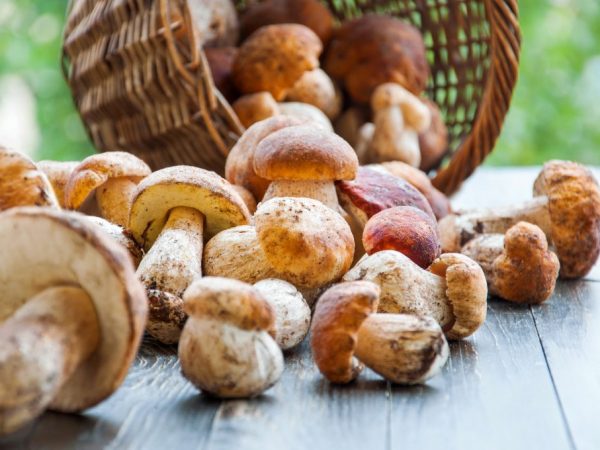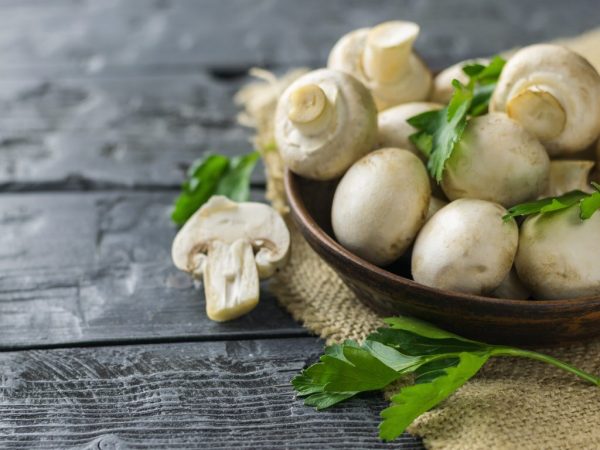Vitamins in mushrooms
The composition of mushrooms includes a large number of different microelements, which makes them no less useful than fruits and vegetables. The vitamins in mushrooms strengthen the immune system, increasing the resistance to infections.

Vitamins in mushrooms
Useful properties of the product
Mushrooms are a storehouse of nutrients. Due to the large amount of proteins, this product is equated to meat, and the low fat content allows it to be used in diets for people with diseases of the liver, biliary tract, cardiovascular system, etc.
Also, the composition of mushrooms contains resins that have bitterness, and essential oils that give a unique aroma. The fruiting bodies contain the following substances:
- Chitin: polysaccharide containing nitrogen. Natural antioxidant, anti-tumor, anti-inflammatory effect. Stimulates tissue regeneration, improves the condition of the skin, hair and nail plates.
- Melanin: helps to improve tissue regeneration, has an effect on all elements of the human endocrine system.
- Amino acids: in the composition of mushrooms there are 18 of them (out of 20 protein-forming). Organic compounds are the basis for the normal functioning of the body.
- Large amount of minerals: among them magnesium, iron, zinc, potassium, phosphorus, etc.
Mushrooms are eaten fried, boiled, baked and pickled. The composition of the product depends on the type of culture, which also determines the characteristics of its use. The most low-calorie is fresh porcini mushroom - 22 kcal per 100 g. Dried mushroom is not included in therapeutic diets, because its caloric content is high and exceeds 200 kcal / 100g.
The beneficial properties of these organisms have long been studied. Extra pounds will also help to lose mushrooms and milk mushrooms. Honey mushrooms are rich in minerals. There is little fat in them, and the calorie content of the product does not exceed 30 kcal / 100 g. These fruit bodies will also be useful for the prevention of intestinal infections and for maintaining normal stable functioning of the endocrine system.
Nutritional value of mushrooms
Mushrooms are prized in cooking as a source of protein and carbohydrates. The spectrum of amino acids in such a product is comparable to that of poultry and veal, and of carbohydrates - to vegetables. Gustatory characteristics will also be important. Each type of mushroom has its own flavor, texture of the pulp, etc. The smell is also strikingly different. The aroma of some varieties of fruit bodies can be sharp, specific due to the content of extract substances and oils in the product.
Mushrooms are low-calorie foods. Fats in them are contained in small quantities, so they are often included in the diet for diets. It is also important that during heat treatment, the mycelium loses some of its fiber, which contributes to better digestion of absorbed food by the stomach.
The product also includes insulin, dextrin and glycogen, which are useful for maintaining efficient organ function. And beta-glucans contribute to the overall strengthening of the immune system, they are similar in their action to some antibiotics. Therefore, fruit bodies of different types are used not only in cooking, but also in medicine.
Vitamins

The amount of vitamins depends on the type of mushroom
Vitamins in mushrooms are mostly represented by group B.It also contains vitamins A, C, and D. They contribute to the normal functioning of organs and systems, and have a stimulating effect on the immune system.
The amount of vitamins in mushrooms depends on the type of culture. Average indicators of their content per 100 g of product are:
- B1 - up to 0.005 mg;
- B2 - up to 0.014 mg;
- B3 - up to 4.85 mg;
- B5 - up to 2.7 mg;
- B6 - up to 0.03 mg;
- B9 - up to 0.004 mg;
- A - up to 0.02-0.04 mg;
- C - up to 14 mg;
- D - up to 0.08 mg;
- E - up to 0.9 mg.
Irina Selyutina (Biologist):
The biochemical composition of the fungus directly depends on its species, place of growth, age and many other factors. Most of the edible mushrooms known to us contain a number of vitamins, such as A, D, E, PP vitamins of group B. In addition to them, macro and microelements (iodine, potassium, iron, sulfur, phosphorus, calcium, etc.) were found in some types of vitamins And there is more than in carrots (the usual source of this vitamin for us), and B vitamins, more than in cereals. By the way. Since mushrooms contain about 1% fat, they contain fat-soluble vitamins A and E.
Also, the composition of the mushrooms includes niacin, or vitamin PP, which is necessary for blood diseases. The richest in vitamins are porcini mushrooms, chanterelles, champignons and milk mushrooms.
Contraindications
The composition of mushrooms is not always beneficial for the human body. The use of the product after heat treatment leads to a decrease in the level of nutrients, vitamins and minerals contained in it. Chitin, which is part of the composition, contributes to the deterioration of the absorption of trace elements.
Fruit bodies can also contain toxic substances and radioactive nuclides. They are found not only in poisonous, but also in ordinary edible fruit bodies that find their way to the counters of markets and shops. To protect yourself from the harmful effects of toxic substances, it is important to adhere to the basic rules for collecting and preparing the product.
Conclusion
Mushrooms are the most useful product for the human body. There is little fat in them, and the amount of useful amino acids is greater than in chicken and veal. They also contain many vitamins that are necessary to maintain the normal functioning of the body.



